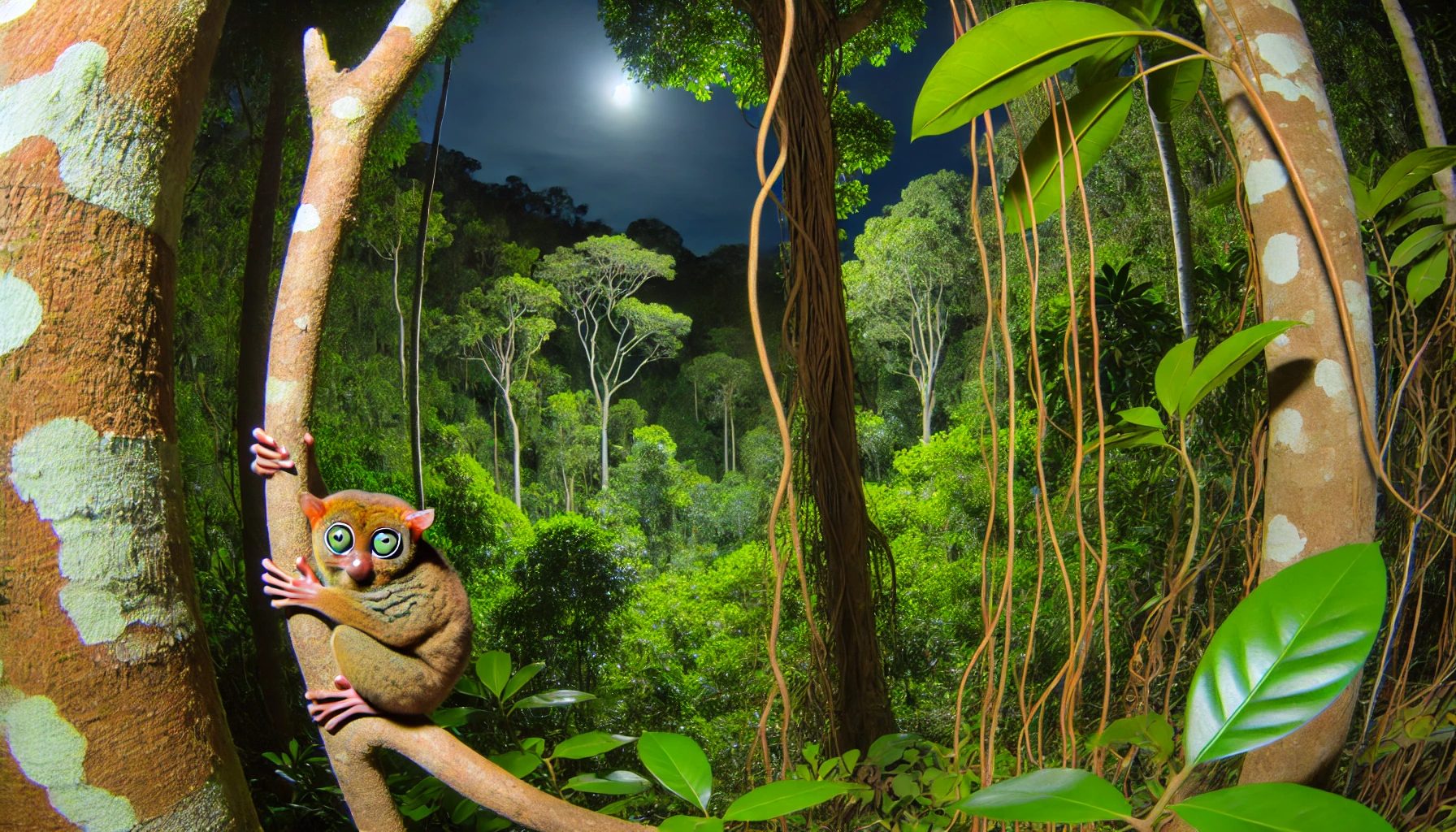
Disclaimer: This content was generated using AI. While I strive for accuracy, I encourage readers to verify important information. I use AI-generated content to increase efficiencies and to provide certain insights, but it may not reflect human expertise or opinions.
The Borneo tarsier, with its oversized eyes and incredible agility, is one of the most fascinating creatures found in Southeast Asia’s dense jungles. This tiny primate, native to the rainforests of Borneo, is as elusive as it is captivating. With a mix of charming curiosity and mysterious nocturnal habits, the Borneo tarsier represents the wonder of nature’s creativity. In this article, we’ll explore what makes this small primate so special and dive deep into its biology, behavior, habitat, and conservation status.
What is the Borneo Tarsier? A Unique Nocturnal Primate
The Borneo tarsier (Tarsius bancanus) belongs to the Tarsiidae family, a group of small primates native to Southeast Asia. Known for their unique appearance, tarsiers are characterized by their large eyes, tiny bodies, and long tails. The Borneo tarsier, in particular, stands out due to its diminutive size, with adults typically weighing between 100 and 150 grams. Despite their small stature, these animals possess powerful hind legs, enabling them to leap impressive distances between trees in search of prey.
Borneo tarsiers are exclusively nocturnal, making the dense forests of Borneo their perfect refuge. They use their keen night vision, thanks to their massive eyes, which are proportionally larger than their brain, to hunt for insects, small birds, and even bats. Tarsiers are also unique among primates for their vertical clinging and leaping ability, using their long fingers and toes to cling onto tree trunks as they hunt and move around.
The Borneo tarsier is a carnivorous primate, feeding primarily on insects and small vertebrates. Unlike other primates, they do not eat fruits or leaves, relying solely on their keen hunting skills to find their next meal. This diet distinguishes them from many other primate species and gives them a special place in the food chain of Borneo’s rich rainforest ecosystem.
The Habitat of the Borneo Tarsier: Thriving in Borneo’s Dense Rainforests
The Borneo tarsier is endemic to the island of Borneo, meaning that it cannot be found naturally in any other part of the world. Borneo, the third-largest island in the world, is known for its lush rainforests, home to an incredible array of biodiversity. The island’s rainforests provide the perfect environment for the tarsier to thrive due to the abundance of trees, dense foliage, and a rich variety of prey species.
The dense tropical rainforest provides the perfect cover for this tiny primate, helping it stay hidden from predators. The thick canopy also offers plenty of branches for the Borneo tarsier to leap between as it searches for food. This rich and biodiverse environment allows the tarsier to hunt efficiently while also offering protection from larger predators like birds of prey and snakes.
One of the key challenges for the Borneo tarsier is habitat loss. The rainforests of Borneo have been subjected to deforestation due to logging, palm oil plantations, and human settlement expansion. These activities have fragmented the tarsier’s natural habitat, leading to population declines in some areas. Conservation efforts are essential to protect these rainforests and ensure that the Borneo tarsier and countless other species continue to have a place to thrive.
Behavior and Social Structure of the Borneo Tarsier
The behavior of the Borneo tarsier is a mixture of stealth, agility, and precision. Being nocturnal, they are most active at night, using their exceptional night vision to hunt. With their large eyes taking in even the smallest amount of light, they can detect the slightest movement from potential prey, whether it be insects or small vertebrates hiding in the undergrowth or perched on tree branches.
The Borneo tarsier’s hunting strategy is one of patience and quick reflexes. Often, they will cling to a tree and watch silently, waiting for the perfect moment to pounce. Their powerful hind legs enable them to leap distances up to 3 meters (10 feet) in one bound, making them formidable hunters despite their small size. Once they spot their prey, they leap towards it, grasping it with their long fingers and sharp claws.
Socially, Borneo tarsiers are generally solitary animals. They prefer to hunt and move through the forest alone, though they will sometimes form small family groups, particularly during the breeding season. Mating pairs will often share territories and communicate through high-pitched vocalizations, which can be heard resonating through the dense forest. However, interactions between individuals are typically brief, as these creatures are highly territorial and prefer solitude.
The Conservation Status of the Borneo Tarsier: Challenges and Solutions
The conservation status of the Borneo tarsier is currently listed as “Vulnerable” by the International Union for Conservation of Nature (IUCN). This designation reflects the numerous challenges that the species faces in the wild, primarily due to human activities that threaten its natural habitat. Deforestation for agriculture, logging, and the expansion of human settlements has resulted in the fragmentation of the Borneo tarsier’s habitat, reducing the areas in which they can live and hunt.
One of the key threats is the establishment of palm oil plantations, which have rapidly spread across Borneo. As rainforests are cleared to make way for these plantations, the Borneo tarsier loses not only its home but also its food sources. The fragmentation of forests creates isolated pockets of habitat, which can lead to inbreeding and a lack of genetic diversity within tarsier populations.
To combat these threats, conservationists are working to protect the remaining rainforests and promote sustainable land-use practices. National parks and protected reserves, such as the Danum Valley Conservation Area and the Tabin Wildlife Reserve, offer safe havens for the tarsier and other species that call Borneo home. Additionally, raising awareness about the importance of preserving Borneo’s rainforests and reducing demand for unsustainable palm oil is crucial for the long-term survival of the Borneo tarsier.
In recent years, eco-tourism has emerged as a valuable tool for conservation. By encouraging responsible tourism, where visitors can observe wildlife like the Borneo tarsier in their natural habitats, local communities can benefit economically while protecting their natural resources. This creates a win-win situation where both the environment and local people can thrive.








